Dive Brief:
- A new report projects that the global electronic scrap recycling market will climb to $34.32 billion by 2022 at a CAGR of 15.7%, with Europe continuing to lead the way — though Asia-Pacific is expected to experience the fastest growth. The small home appliances niche will likely see the fastest spurt by volume, says Transparency Market Research, the report authors.
- Growth drivers are advancements in technology making devices outdated and generating massive volumes of e-waste; legislation prohibiting e-waste disposal in landfills, incinerating it, or shipping it overseas; its high content of valuable precious metals such as gold, silver, palladium, tantalum, and gallium; and e-cycling’s role in conserving energy, reducing greenhouse gas emissions, and saving resources by extracting fewer raw materials from the earth.
- Some other key study points are:
- Smelting and refining companies will increase their electronic scrap processing capacity.
- The precious metals segment is expected to grow at a CAGR of 11.2%.
- More gold is recovered from one ton of e-waste from circuit boards than from 17 tons of gold ores, among large factors driving the boom.
Dive Insight:
Around 20 million to 50 million tons of e-waste are produced annually, increasing three times faster than any other municipal waste, and the e-cycling market is expanding with it. There are multiple factors driving this boom and that explain why the report authors say it will likely continue, such as expanding markets, rapid product innovations, and expensive precious metals that can be extracted from devices fairly easily. But the materials are hazardous, requiring meticulous management and processing. This challenge opens opportunities for skilled recyclers, especially smelting and refining facilities.
Moving forward, the report authors say e-cycling stakeholders should not only keep an eye on Europe and Asia-Pacific, but there will be multiple key players to watch out for who will lead the way. A few among dozens cited are Boliden Group, Umicore N.V., Dowa Holdings, Ultromex, and Mitsubishi Materials USA Corporation.
But with the industry boom, consumer education on disposal is important, and there is a need for rules to ensure manufacturers take up some of this disposal’s cost so burden does not fall primarily on municipalities and private processors.









